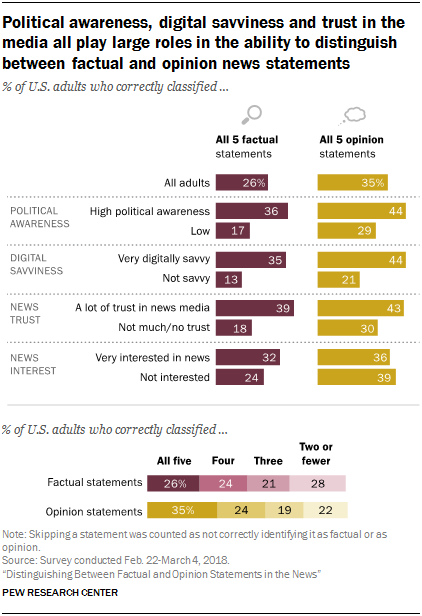In today’s fast-paced and complex information environment, news consumers must make rapid-fire judgments about how to internalize news-related statements – statements that often come in snippets and through pathways that provide little context. A new Pew Research Center survey of 5,035 U.S. adults examines a basic step in that process: whether members of the public can recognize news as factual – something that’s capable of being proved or disproved by objective evidence – or as an opinion that reflects the beliefs and values of whoever expressed it.
The findings from the survey, conducted between Feb. 22 and March 8, 2018, reveal that even this basic task presents a challenge. The main portion of the study, which measured the public’s ability to distinguish between five factual statements and five opinion statements, found that a majority of Americans correctly identified at least three of the five statements in each set. But this result is only a little better than random guesses. Far fewer Americans got all five correct, and roughly a quarter got most or all wrong. Even more revealing is that certain Americans do far better at parsing through this content than others. Those with high political awareness, those who are very digitally savvy and those who place high levels of trust in the news media are better able than others to accurately identify news-related statements as factual or opinion.
…Trust in those who do the reporting also matters in how that statement is interpreted. Almost four-in-ten Americans who have a lot of trust in the information from national news organizations (39%) correctly identified all five factual statements, compared with 18% of those who have not much or no trust. However, one other trait related to news habits – the public’s level of interest in news – does not show much difference.
In addition to political awareness, party identification plays a role in how Americans differentiate between factual and opinion news statements. Both Republicans and Democrats show a propensity to be influenced by which side of the aisle a statement appeals to most. For example, members of each political party were more likely to label both factual and opinion statements as factual when they appealed more to their political side.

No comment.
UPDATE: I lied. Here’s a comment from Jason Brennan, who has some pointed and insightful critiques of the study’s design:
First, this trades on a questionable and controversial view about whether normative statements are objective and provable. American K-12 schools dogmatically teach the view that all normative statements are subjective and mere opinion, but that’s in fact (and this is not mere opinion) a highly controversial philosophical claim. See this NY Times blog complaining about this: https://opinionator.blogs.nytimes.com/2015/03/02/why-our-children-dont-think-there-are-moral-facts/
Second, the normative statements in the bottom are what we might call “thick” rather than “thin” normative claims. A thin claim simply offers an evaluation, e.g., “Crooked Timber is bad.” A thick claim contains both normative components but also encapsulates, presupposes, encompasses, or in some way contains background descriptive claims. For example, “Corey Robin is intellectually dishonest” or “Michael Huemer is brave.”
Most of these statements are “thick” in that sense.
Is government wasteful and inefficient? I’m not sure if that is to be interpreted entirely as an opinion claim, or whether it is not entirely provable. “Efficiency” has multiple descriptive meanings in economics. “Wasteful” can be seen as a slightly normatively loaded version of “inefficient”; e.g., “This engine is less efficient than that engine, so it’s wasteful.” Economists regularly make claims like this when studying various institutions, and they see themselves as doing descriptive, positive work.
Are immigrants a big problem? Again, this question presupposes some normative commitments. However, we also tend to summarize descriptive claims in normative ways when the background normative commitments are shared. Someone reading this might think the statement is–as it often would be in conversational English–a way of summarizing a longer statement: “Immigrants cause crime, undermine social cohesion, and strain government budgets by consuming public goods, schooling, and social insurance.” (Note that I do not endorse these descriptive claims.) Similarly, if a medical doctor said, “Jason, your cancer is a aggressive and is going to be a big problem,” I wouldn’t think to respond, “Just give me the facts, doc.” Instead, it’s a way of summarizing such things as “The cancer has metastasized and is unlikely to respond to common treatments.”
Similar comments apply to the other opinion statements. Yes, they contain normative components, but nevertheless, the study both A) presupposes a problematic view about the objectivity of normative statements and B) seems to ignore or have questionable views about the pragmatics of thick normative statements.